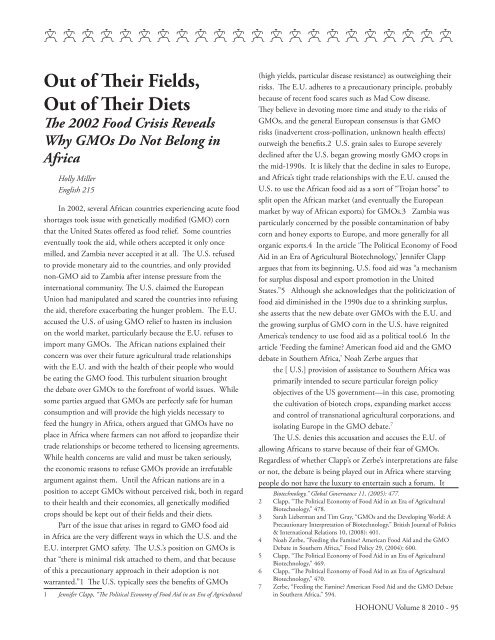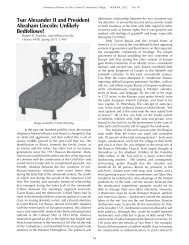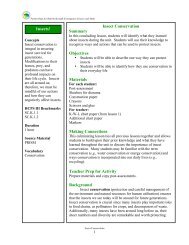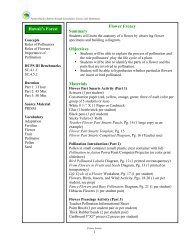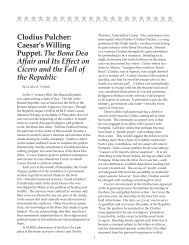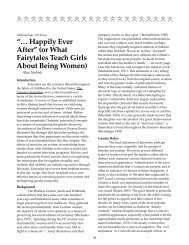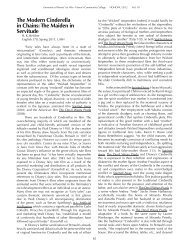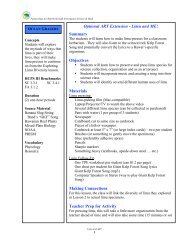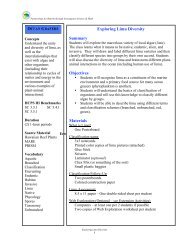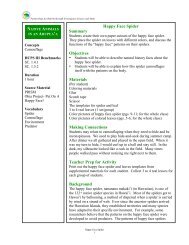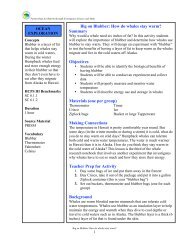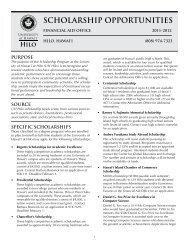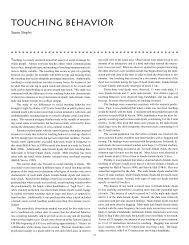A JOURNAL OF ACADEMIC WRITING VOLUME 8
A JOURNAL OF ACADEMIC WRITING VOLUME 8
A JOURNAL OF ACADEMIC WRITING VOLUME 8
You also want an ePaper? Increase the reach of your titles
YUMPU automatically turns print PDFs into web optimized ePapers that Google loves.
d d d d d d d d d d d d d d d d d d d d d d<br />
Out of Their Fields,<br />
Out of Their Diets<br />
The 2002 Food Crisis Reveals<br />
Why GMOs Do Not Belong in<br />
Africa<br />
Holly Miller<br />
English 215<br />
In 2002, several African countries experiencing acute food<br />
shortages took issue with genetically modified (GMO) corn<br />
that the United States offered as food relief. Some countries<br />
eventually took the aid, while others accepted it only once<br />
milled, and Zambia never accepted it at all. The U.S. refused<br />
to provide monetary aid to the countries, and only provided<br />
non-GMO aid to Zambia after intense pressure from the<br />
international community. The U.S. claimed the European<br />
Union had manipulated and scared the countries into refusing<br />
the aid, therefore exacerbating the hunger problem. The E.U.<br />
accused the U.S. of using GMO relief to hasten its inclusion<br />
on the world market, particularly because the E.U. refuses to<br />
import many GMOs. The African nations explained their<br />
concern was over their future agricultural trade relationships<br />
with the E.U. and with the health of their people who would<br />
be eating the GMO food. This turbulent situation brought<br />
the debate over GMOs to the forefront of world issues. While<br />
some parties argued that GMOs are perfectly safe for human<br />
consumption and will provide the high yields necessary to<br />
feed the hungry in Africa, others argued that GMOs have no<br />
place in Africa where farmers can not afford to jeopardize their<br />
trade relationships or become tethered to licensing agreements.<br />
While health concerns are valid and must be taken seriously,<br />
the economic reasons to refuse GMOs provide an irrefutable<br />
argument against them. Until the African nations are in a<br />
position to accept GMOs without perceived risk, both in regard<br />
to their health and their economies, all genetically modified<br />
crops should be kept out of their fields and their diets.<br />
Part of the issue that arises in regard to GMO food aid<br />
in Africa are the very different ways in which the U.S. and the<br />
E.U. interpret GMO safety. The U.S.’s position on GMOs is<br />
that “there is minimal risk attached to them, and that because<br />
of this a precautionary approach in their adoption is not<br />
warranted.”1 The U.S. typically sees the benefits of GMOs<br />
1 Jennifer Clapp, “The Political Economy of Food Aid in an Era of Agricultural<br />
(high yields, particular disease resistance) as outweighing their<br />
risks. The E.U. adheres to a precautionary principle, probably<br />
because of recent food scares such as Mad Cow disease.<br />
They believe in devoting more time and study to the risks of<br />
GMOs, and the general European consensus is that GMO<br />
risks (inadvertent cross-pollination, unknown health effects)<br />
outweigh the benefits.2 U.S. grain sales to Europe severely<br />
declined after the U.S. began growing mostly GMO crops in<br />
the mid-1990s. It is likely that the decline in sales to Europe,<br />
and Africa’s tight trade relationships with the E.U. caused the<br />
U.S. to use the African food aid as a sort of “Trojan horse” to<br />
split open the African market (and eventually the European<br />
market by way of African exports) for GMOs.3 Zambia was<br />
particularly concerned by the possible contamination of baby<br />
corn and honey exports to Europe, and more generally for all<br />
organic exports.4 In the article ‘The Political Economy of Food<br />
Aid in an Era of Agricultural Biotechnology,’ Jennifer Clapp<br />
argues that from its beginning, U.S. food aid was “a mechanism<br />
for surplus disposal and export promotion in the United<br />
States.”5 Although she acknowledges that the politicization of<br />
food aid diminished in the 1990s due to a shrinking surplus,<br />
she asserts that the new debate over GMOs with the E.U. and<br />
the growing surplus of GMO corn in the U.S. have reignited<br />
America’s tendency to use food aid as a political tool.6 In the<br />
article ‘Feeding the famine? American food aid and the GMO<br />
debate in Southern Africa,’ Noah Zerbe argues that<br />
the [ U.S.] provision of assistance to Southern Africa was<br />
primarily intended to secure particular foreign policy<br />
objectives of the US government—in this case, promoting<br />
the cultivation of biotech crops, expanding market access<br />
and control of transnational agricultural corporations, and<br />
isolating Europe in the GMO debate. 7<br />
The U.S. denies this accusation and accuses the E.U. of<br />
allowing Africans to starve because of their fear of GMOs.<br />
Regardless of whether Clapp’s or Zerbe’s interpretations are false<br />
or not, the debate is being played out in Africa where starving<br />
people do not have the luxury to entertain such a forum. It<br />
Biotechnology,” Global Governance 11, (2005): 477.<br />
2 Clapp, “The Political Economy of Food Aid in an Era of Agricultural<br />
Biotechnology,” 478.<br />
3 Sarah Lieberman and Tim Gray, “GMOs and the Developing World: A<br />
Precautionary Interpretation of Biotechnology.” British Journal of Politics<br />
& International Relations 10, (2008): 401.<br />
4 Noah Zerbe, “Feeding the Famine? American Food Aid and the GMO<br />
Debate in Southern Africa,” Food Policy 29, (2004): 600.<br />
5 Clapp, “The Political Economy of Food Aid in an Era of Agricultural<br />
Biotechnology,” 469.<br />
6 Clapp, “The Political Economy of Food Aid in an Era of Agricultural<br />
Biotechnology,” 470.<br />
7 Zerbe, “Feeding the Famine? American Food Aid and the GMO Debate<br />
in Southern Africa,” 594.<br />
HOHONU Volume 8 2010 - 95


